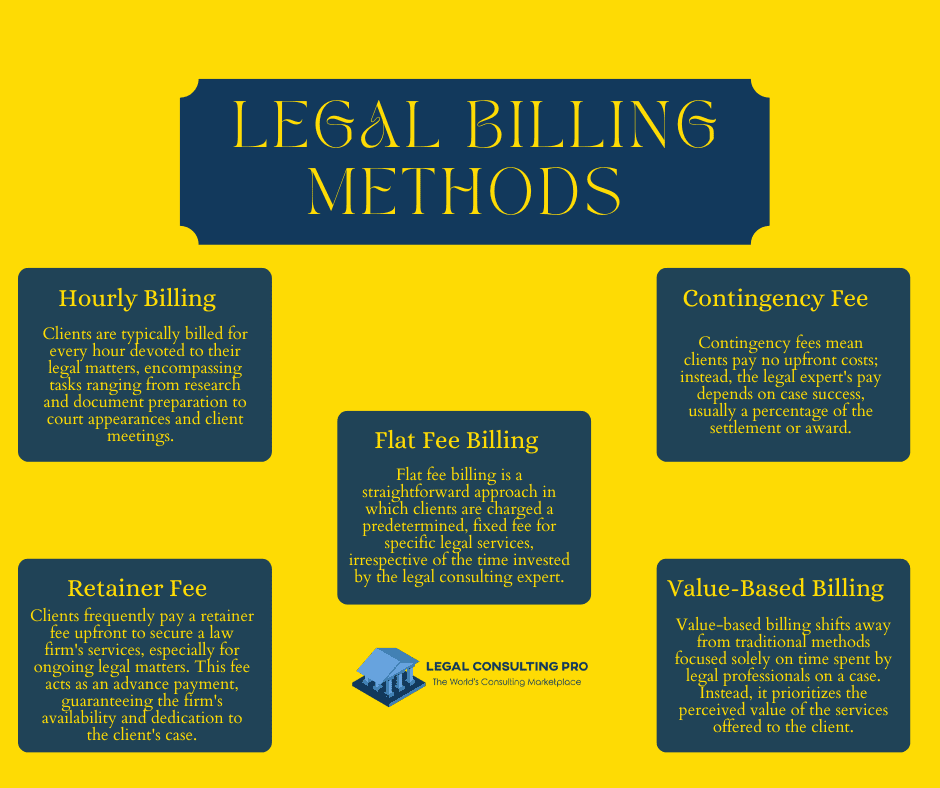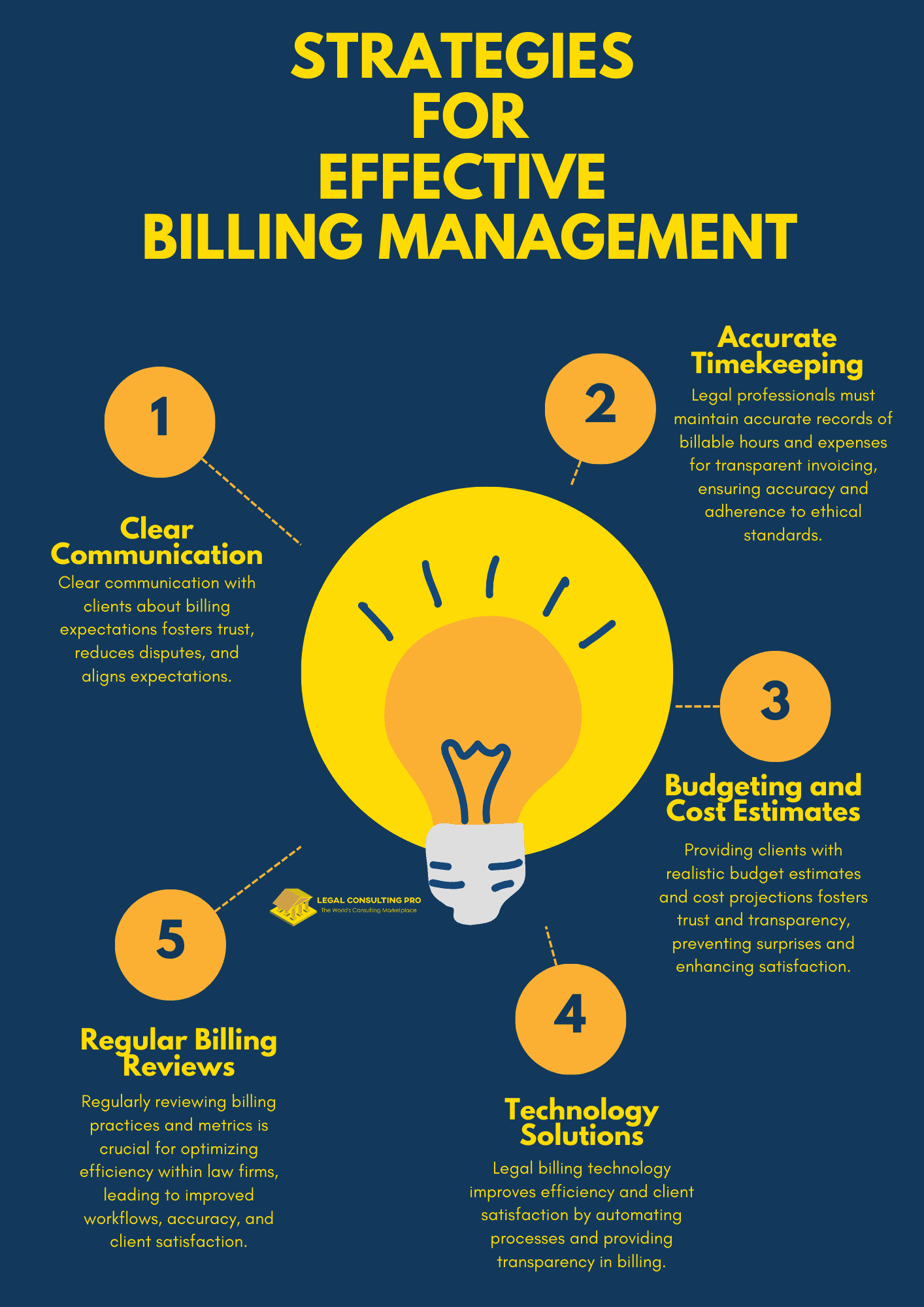Legal Billing is an integral aspect of the legal profession, serving as the mechanism through which legal services are monetized and transactions between clients and law firms are formalized. However, understanding legal billing can be complex for both clients and law firms alike. This guide aims to provide a comprehensive overview of legal billing practices, shedding light on the various billing methods, factors influencing billing rates, ethical considerations, and strategies for effective billing management.
The article explores various aspects of legal billing, including different billing methods, factors influencing billing rates, ethical considerations, and strategies for effective billing management.
Legal Billing Methods
Hourly Billing:
Hourly billing stands as a prevalent method employed by law firms, operating on the principle of charging clients in proportion to the hours expended by legal consulting professionals and supporting staff on their respective cases. Under this system, clients are typically billed for every hour devoted to their legal matters, encompassing tasks ranging from research and document preparation to court appearances and client meetings.
However, the rates assigned to these billable hours can fluctuate considerably based on several determinants. Chief among these factors is the legal consulting professional’s level of experience, with seasoned attorneys commanding higher rates compared to their less experienced counterparts. Moreover, geographic location serves as another influential aspect, with legal markets in major urban centers often witnessing higher billing rates due to elevated operational costs.
Furthermore, the complexity of the legal matter itself plays a pivotal role, as intricate cases demanding specialized expertise or extensive resources may warrant higher hourly rates to compensate for the added complexities and potential risks involved. As such, while hourly billing offers transparency in tracking time and effort expended on behalf of clients, the variation in rates underscores the need for clients to carefully consider these factors when engaging legal services.
Flat Fee Billing:
Flat fee billing is a straightforward approach in which clients are charged a predetermined, fixed fee for specific legal services, irrespective of the time invested by the legal consulting expert. This method provides clients with clarity and predictability regarding the cost of legal services, as they know upfront the exact amount they will be charged for the designated legal work.
Flat fee billing is particularly suited for routine legal matters with well-defined scopes and predictable workloads, such as drafting contracts, preparing wills, or handling simple real estate transactions. By establishing a fixed fee for these standardized services, both clients and law firms can avoid the uncertainty associated with hourly billing and focus on delivering the required legal services efficiently.
Moreover, flat fee billing promotes transparency in pricing, allowing clients to budget effectively without the concern of unexpected expenses arising from additional billable hours. However, it is essential for law firms to carefully assess the scope of work and potential complexities involved in each case to ensure that the flat fee accurately reflects the effort required to achieve the desired outcomes.
Despite its suitability for routine matters, flat fee billing may not be appropriate for highly complex or unpredictable legal issues where the scope of work is difficult to define in advance.
Contingency Fee:
Contingency fee arrangements represent a unique billing method in which clients do not pay upfront legal fees. Instead, the legal consulting expert’s compensation is contingent upon the successful outcome of the case, typically in the form of a percentage of the client’s settlement or award. This method is prevalent in personal injury cases and other civil litigation matters where clients may lack the financial means to cover legal expenses upfront.
By eliminating the need for clients to pay fees out of pocket, contingency fee arrangements provide access to legal representation for individuals who might otherwise be unable to afford it. This aligns the interests of the legal consulting expert and the client, as the legal consulting expert’s fee is directly tied to the outcome of the case. Legal consulting professionals undertaking contingency fee cases often invest significant time, resources, and expertise upfront, bearing the financial risk of the case’s outcome.
In exchange, they stand to receive a portion of the client’s recovery if successful. However, clients need to understand that they may still be responsible for certain expenses, such as court filing fees and expert witness costs, even in contingency fee arrangements. Overall, contingency fee arrangements serve as a crucial avenue for ensuring access to justice for individuals with limited financial means, particularly in cases where significant damages are at stake.
Retainer Fee:
Clients often opt to pay a retainer fee upfront to secure the services of a law firm, particularly in cases where ongoing legal representation is anticipated. This retainer fee functions as a form of advance payment, ensuring that the law firm reserves time and resources to handle the client’s legal matters. Subsequent fees incurred for the provision of legal services are then deducted from this retainer as work is performed. Retainer agreements typically outline the scope of services covered, the billing rates applicable, and the terms of payment. Importantly, retainer fees can vary widely depending on factors such as the nature and complexity of the legal matters involved, as well as the anticipated duration of representation.
One key aspect of retainer fees is that they can be replenished as needed. As the retainer balance diminishes with the deduction of fees for services rendered, clients may be required to replenish the retainer to ensure that sufficient funds are available to cover future legal expenses. This ensures that the law firm can continue to provide uninterrupted representation without delays due to insufficient funds.
Furthermore, if the retainer remains partially or fully unused after legal representation, clients may be entitled to a refund of the unused portion. However, the specific terms governing retainer refunds are typically outlined in the retainer agreement and may vary depending on the agreement between the client and the law firm.
Value-Based Billing:
Value-based billing represents a departure from traditional billing methods that focus solely on the time expended by legal consulting professionals and staff on a particular matter. Instead, this innovative approach emphasizes the perceived value of the legal services provided to the client. In essence, value-based billing seeks to align the interests of the client and the law firm by prioritizing the achievement of client objectives efficiently and effectively.
Under value-based billing, the fee structure is determined based on the outcomes achieved or the value delivered to the client, rather than the hours worked. This can involve various metrics, such as the successful completion of a transaction, the resolution of a dispute, or the attainment of specific client goals. By tying fees to the value derived from the legal services, this approach incentivizes law firms to prioritize client satisfaction and success, rather than simply maximizing billable hours.
Value-based billing encourages collaboration and transparency between clients and law firms, fostering a partnership dynamic where both parties work towards shared objectives. It allows clients to better predict and budget for legal expenses while incentivizing law firms to deliver high-quality, efficient services that meet or exceed client expectations.
Moreover, value-based billing promotes innovation and creativity in legal service delivery, as it encourages law firms to explore alternative methods and technologies to achieve client objectives more effectively. By focusing on the value delivered rather than the time spent, this approach enables law firms to tailor their services to meet the unique needs and preferences of each client, ultimately enhancing the overall client experience.

Factors Influencing Billing Rates:
Several different factors might affect legal billing rates. here are the most common factors influencing the rates:
- Legal consulting expert Experience and Expertise: Senior legal consulting professionals with extensive experience typically command higher billing rates compared to junior associates. Specialized expertise in niche areas of law may also justify higher rates.
- Geographic Location: Billing rates can vary significantly based on the region, with major metropolitan areas generally having higher rates compared to rural areas.
- The complexity of the Matter: Cases involving complex legal issues or high levels of risk may require more time and resources, resulting in higher billing rates.
- Overhead Costs: Law firms must cover various overhead expenses, including office space, technology, and support staff, which may influence billing rates.
- Market Competition: Competitive pressures within the legal industry can impact billing rates, with firms often adjusting their rates to remain competitive in the market.
Ethical Considerations:
- Fee Transparency: Law firms must provide clients with clear and transparent information regarding their billing practices, including rates, fees, and billing methods.
- Reasonableness of Fees: Legal consulting professionals are ethically obligated to ensure that their fees are reasonable and commensurate with the services provided, taking into account factors such as the complexity of the matter and the legal consulting expert’s experience.
- Conflicts of Interest: Law firms must navigate potential conflicts of interest when billing clients, ensuring that their fees are not influenced by conflicting obligations or interests.
- Billing Disputes: Clients have the right to dispute legal fees that they believe are excessive or unjustified, and legal consulting professionals must address these concerns promptly and in good faith.
Strategies for Effective Billing Management:
Clear Communication:
Establishing open and transparent communication with clients regarding billing expectations, rates, and fee structures is essential to mitigate misunderstandings and disputes. By clearly outlining the billing process and discussing fee structures upfront, clients can better understand the anticipated costs of legal services. This fosters trust and transparency in the client-legal consulting pro relationship, reducing the likelihood of disagreements over billing matters and ensuring that both parties are aligned in their expectations.
Accurate Timekeeping:
Legal consulting professionals and staff must diligently maintain accurate records of billable hours and incurred expenses for each legal matter to ensure precise invoicing and billing. This meticulous documentation not only facilitates transparent communication with clients but also ensures that clients are billed accurately for the services provided. Accurate record-keeping helps to avoid discrepancies or disputes regarding billing, enhances accountability within the law firm, and promotes adherence to ethical standards governing legal billing practices. By maintaining detailed records, legal consulting professionals can demonstrate the value of their services and provide clients with a clear breakdown of the work performed and associated costs.
Budgeting and Cost Estimates:
Supplying clients with realistic budget estimates and cost projections is pivotal for managing their expectations and preventing surprises. These projections allow clients to plan and budget effectively, considering potential legal expenses. By providing transparent information upfront, law firms foster trust and transparency in the client-legal consulting pro relationship, reducing the risk of misunderstandings or disputes over billing matters. Ultimately, clear financial expectations from the outset enhance client satisfaction and establish lasting client relationships.
Technology Solutions:
Utilizing legal billing software and technology platforms can streamline billing processes, enhance accuracy, and improve client billing experiences. These tools automate time tracking, invoice generation, and expense management, reducing administrative burdens and potential errors associated with manual billing methods. Moreover, advanced features such as real-time reporting and client portals offer clients greater transparency and control over their billing information. By leveraging technology, law firms can optimize billing efficiency, reduce overhead costs, and deliver a more streamlined and client-centric billing experience, ultimately enhancing overall client satisfaction.
Regular Billing Reviews:
Regularly reviewing billing practices and performance metrics is essential for identifying areas of improvement and optimizing billing efficiency within law firms. By analyzing billing data and metrics, firms can identify trends, pinpoint inefficiencies, and address potential bottlenecks in the billing process. This proactive approach enables firms to streamline workflows, reduce billing errors, and enhance overall efficiency. Additionally, conducting regular reviews allows firms to assess the effectiveness of their billing strategies and make informed decisions to better serve clients and improve profitability. Ultimately, by continuously evaluating and refining billing practices, law firms can achieve greater transparency, accuracy, and client satisfaction in their billing processes.

Outsourcing: The Life Saver
Outsourcing legal billing has emerged as an effective strategy for law firms seeking to streamline operations, reduce costs, and enhance overall efficiency. By entrusting billing tasks to specialized external service providers, law firms can benefit from expert assistance, improved accuracy, and increased flexibility in managing their billing processes. This approach has gained traction in the legal industry due to its potential to optimize resources, enhance client satisfaction, and drive firm profitability.
Outsourcing legal billing offers several advantages for law firms. Firstly, it allows firms to focus on their core legal activities while delegating time-consuming billing tasks to dedicated professionals. By freeing up legal consulting professionals and staff from administrative duties, firms can allocate more time and resources to providing high-quality legal services and nurturing client relationships. Moreover, outsourcing enables firms to access specialized expertise and advanced technology platforms that may not be available in-house, resulting in more efficient and accurate billing processes.
Another key benefit of outsourcing legal billing is cost savings. External billing service providers often operate at lower costs compared to maintaining an in-house billing department. By outsourcing, law firms can avoid expenses associated with hiring, training, and managing billing staff, as well as investing in costly billing software and infrastructure. Additionally, outsourcing providers typically offer flexible pricing models, allowing firms to scale their billing services according to their needs and budgetary constraints.
Furthermore, outsourcing legal billing can lead to improved accuracy and compliance with billing regulations. External billing professionals are well-versed in legal billing best practices and regulatory requirements, ensuring that invoices are prepared accurately and per client agreements and billing guidelines. This helps to minimize billing errors, disputes, and compliance issues, enhancing the overall integrity and transparency of the billing process.
Introducing Legal Consulting Pro
One notable example of a firm excelling in legal billing services is Legal Consulting Pro. With a track record of delivering exceptional billing solutions and garnering more than 98% client satisfaction, Legal Consulting Pro stands out as a leader in the field. The firm offers a comprehensive range of billing services tailored to the specific needs of law firms, including timekeeping, invoice preparation, expense management, and reporting.
Legal Consulting Pro leverages advanced technology and industry expertise to deliver efficient and accurate billing solutions. The firm employs skilled billing professionals who undergo rigorous training and certification programs to ensure proficiency in legal billing practices and regulations. Moreover, Legal Consulting Pro utilizes cutting-edge billing software and automation tools to streamline workflows, enhance accuracy, and improve billing efficiency.
One of the key factors contributing to Legal Consulting Pro’s success is its commitment to client satisfaction. The firm prioritizes client feedback and continually strives to exceed client expectations by delivering high-quality, personalized billing services. Legal Consulting Pro maintains open lines of communication with clients, providing regular updates, transparent billing reports, and responsive customer support to address any concerns or inquiries promptly.
In addition to focusing on client satisfaction, Legal Consulting Pro emphasizes integrity, transparency, and ethical conduct in all aspects of its billing operations. The firm adheres strictly to industry standards and regulatory requirements, ensuring compliance with legal and ethical guidelines governing billing practices. This commitment to professionalism and accountability has earned Legal Consulting Pro a reputation as a trusted partner for law firms seeking reliable and efficient billing solutions.
In conclusion, outsourcing legal billing has proven to be an effective strategy for law firms looking to optimize their billing processes and improve overall efficiency. By leveraging external expertise and resources, firms can enhance accuracy, reduce costs, and enhance client satisfaction. Legal Consulting Pro exemplifies excellence in legal billing services, offering comprehensive solutions tailored to the specific needs of law firms and achieving high levels of client satisfaction through its commitment to quality, integrity, and professionalism.
Case Studies
Case Study 1: Overbilling Dispute Resolution
Incident: A law firm faced allegations of overbilling from a client who received invoices significantly higher than initially estimated for a particular legal matter. The client contested the charges, claiming that the firm had billed for unnecessary or duplicated work, leading to a breakdown in the client-legal consulting pro relationship and threatening the firm’s reputation.
Resolution: To address the overbilling dispute, the law firm initiated an internal investigation to review the billing records and identify any discrepancies. Upon thorough examination, it was discovered that there had been errors in timekeeping, with certain tasks being billed multiple times or inaccurately recorded. The firm promptly acknowledged the billing discrepancies to the client and offered to rectify the situation by issuing revised invoices with corrected charges. Additionally, the firm implemented stricter billing controls and provided additional training to staff on proper timekeeping practices to prevent similar issues in the future. Through open communication, transparency, and a commitment to rectifying errors, the law firm successfully resolved the overbilling dispute, salvaging the client relationship and restoring trust.
Case Study 2: Billing Transparency Enhancement
Incident: A law firm received complaints from several clients regarding a lack of transparency in its billing practices. Clients expressed frustration over receiving invoices with vague or ambiguous descriptions of services rendered, making it difficult to understand the charges and assess the value of the legal services provided.
Resolution: In response to the billing transparency concerns, the law firm implemented measures to enhance the clarity and detail of its invoices. This included revising invoice templates to provide more comprehensive descriptions of the work performed, specifying the tasks completed, the time spent, and the individuals involved. Additionally, the firm introduced regular billing status updates and client consultations to ensure that clients remained informed about their billing status and could raise any concerns or questions promptly. By prioritizing transparency and communication in its billing practices, the law firm addressed client concerns, improved satisfaction, and strengthened its reputation for integrity and accountability.
Case Study 3: Fee Dispute Resolution through Negotiation
Incident: A law firm encountered a fee dispute with a client who contested the total amount billed for legal services, claiming that the fees exceeded the agreed-upon budget and were not commensurate with the outcomes achieved. The client threatened to withhold payment and pursue legal action if the matter was not resolved satisfactorily.
Resolution: Recognizing the importance of preserving the client relationship and avoiding litigation, the law firm engaged in constructive negotiations with the client to resolve the fee dispute amicably. This involved a detailed review of the legal services provided, the outcomes achieved, and the client’s expectations regarding fees. Through open dialogue and compromise, the parties reached a mutually acceptable resolution, with the law firm agreeing to adjust the fees to better align with the client’s budget constraints and satisfaction with the services rendered. By demonstrating flexibility, empathy, and a willingness to address the client’s concerns, the law firm successfully resolved the fee dispute, preserved the client relationship, and avoided costly litigation.
Conclusion
Understanding legal billing is essential for both clients and law firms to foster transparent, mutually beneficial relationships. By familiarizing themselves with various billing methods, factors influencing billing rates, ethical considerations, and strategies for effective billing management, clients and law firms can navigate the complexities of legal billing with confidence, ensuring fair and transparent billing practices that uphold the integrity of the legal profession.












































